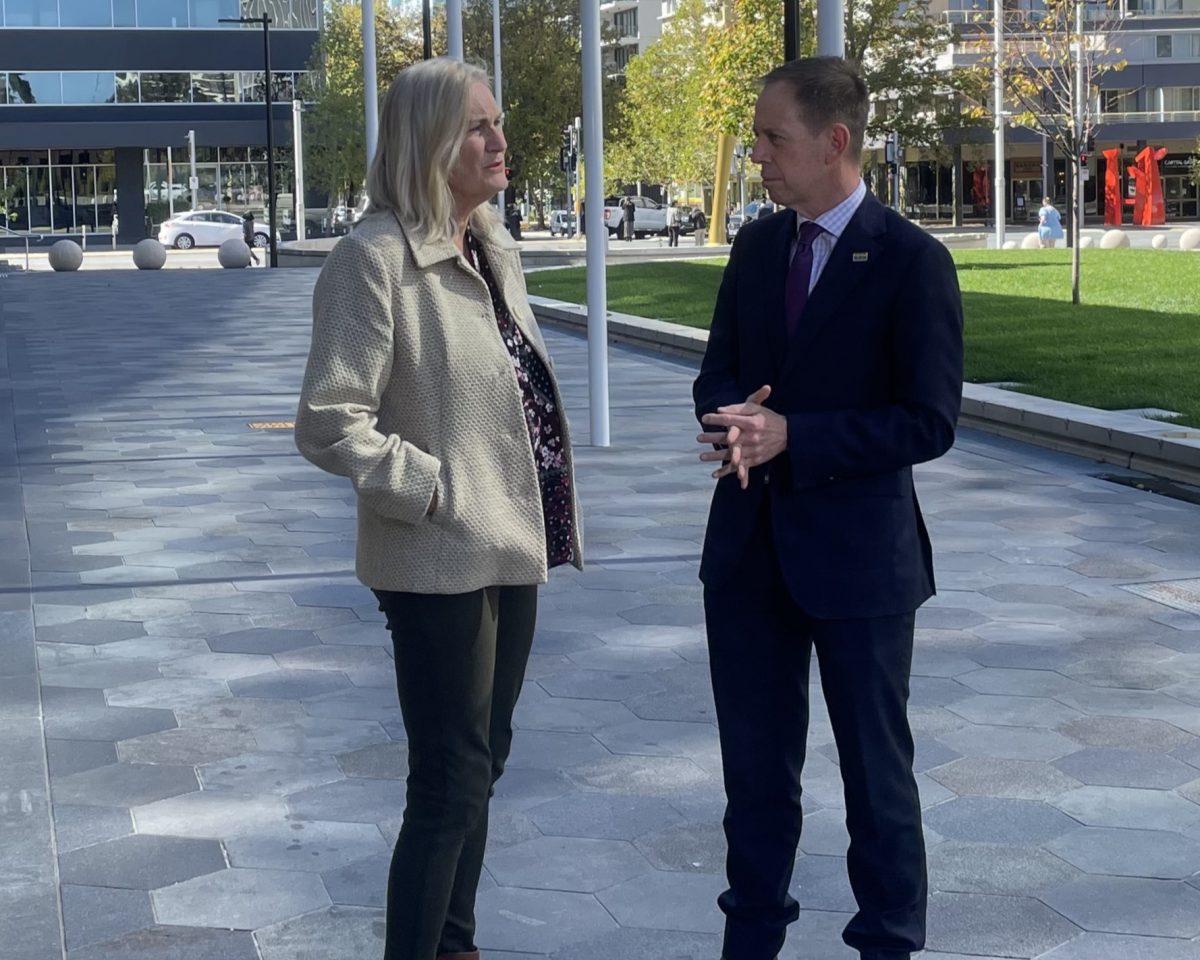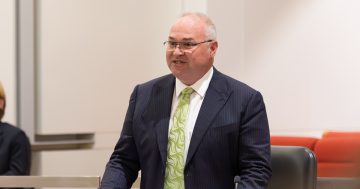
Carmel Franklin and Shane Rattenbury at the launch of the rent relief scheme at the Legislative Assembly. Photo: Lizzie Waymouth.
Attourney-General Shane Rattenbury has announced the launch of a new $750,000 rental relief fund for Canberrans facing financial hardship. Applications for the grant opened on Monday (17 April) and will close on 30 June 2024.
Approved applicants will receive a one-off grant for up to four weeks’ rent, capped at $2500 and paid directly to the landlord or grantor. They will also be offered support services to help manage rental costs over the longer term.
The fund is overseen by the ACT Coordinator General for Housing and administered by Care, a community organisation supporting people experiencing financial difficulties.
At a stand-up on Monday launching the fund, Mr Rattenbury said: “This is an important mechanism to ensure that Canberrans who are struggling to meet their rent get a helping hand to make sure they don’t end up homeless or lose their tenancy.”
“We are really conscious that people are feeling the financial pressure in the city at the moment. This rent relief fund first operated during COVID and was very important in helping people maintain their tenancy … In light of the financial pressure we are aware the Canberra community is under, we’ve put another $750,000 in the program.”
The first rent relief fund opened in November 2021 and provided a maximum $1000 payment for tenants facing financial difficulties, with 133 renters benefitting from the scheme.
“The feedback we have from the first iteration during COVID was that it was very effective in helping people maintain their tenancies and not have to give up a tenancy through some sort of financial shock,” he said.
The new fund comes at a critical time as more and more Canberrans face difficulties keeping up with rising living costs.
While rental growth in Canberra has slowed, with rental costs falling very slightly in recent months, it remains Australia’s second most expensive capital city with a median rent of $674 per week – considerably higher than the combined average of $594 among the country’s major cities.
Care CEO Carmel Franklin said that the proportion of calls Care received relating to private rental stress had almost doubled from 5.3 per cent in October-December 2022 to 9.1 per cent in January-March 2023.
“Almost all the calls we get are about the cost of living, and housing is the biggest issue. It will either be rent or mortgage stress,” Ms Franklin told Region.
She said that by the time applications opened, they had already received 17 enquiries – although some had been waiting for the scheme to open for several weeks. Ms Franklin said that three applications had been approved that morning alone.
“Rents have gone up, there’s not a lot of vacancies, and everything else has gone up as well,” she said.
“They’re in financial stress, and if your rent goes up, it’s just one more cost that tips you over the edge.”
While the scheme offers support for four weeks of rental payments, Ms Franklin says that most applicants face difficulties that cannot be resolved within the space of a month.
“People who are applying are probably experiencing long-term stress,” she said, but the grant still makes a difference by allowing them to focus on tackling other financial issues, as well as directing them to Care’s other free support services.
“In large part, the reason we’ve been asked to administer [the fund] is because we can refer people to our financial counselling service,” she said, explaining that the rental relief can help people tackle other issues, such as utility payments or paying off buy now, pay later debts, putting them in a “better position in the longer term”.
Renters are eligible for the fund if they are experiencing either rental stress or severe financial hardship.
An individual or household will be experiencing rental stress where the household pays more than 30 per cent of household income in rent and has liquid assets of $5,000 or less (excluding superannuation).
An individual or household will be experiencing severe financial hardship where the household pays less than 30 per cent of household income in rent but can otherwise demonstrate that they are experiencing severe financial hardship and they have less than $3,000 in liquid assets (excluding superannuation).
Additionally, to be eligible for a grant, an applicant must have a gross household income within the following limits:
- First adult $54,643
- First sole parent $57,474
- Each additional adult $20,905
- Each child $18,127.
For more information on the Rent Relief Fund, visit Care’s website.





















